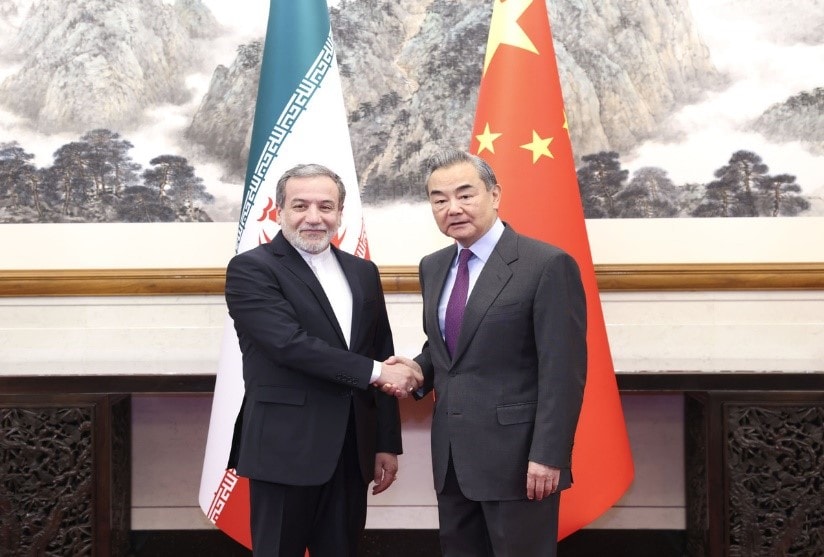On December 28, 2024, Chinese Foreign Minister Wang Yi met with Iranian Foreign Minister Seyyed Abbas Araghchi in Beijing. The Chinese Communist Party (CCP) mouthpiece Global Times wrote that Wang emphasized that both countries should continue to support each other on issues related to their core interests. "Wang also emphasized that, in the face of today's world of instability and uncertainty, we must remain resolute, firmly believe that the historical trend of world multipolarity, economic globalization, and cultural diversity is unstoppable, and that unilateral hegemony will ultimately lose support," the Global Times reported.
Iranian Foreign Minister Abbas Araghchi added that the Islamic Republic of Iran is committed to maximizing its collaboration with China, and considers the 25-year cooperation plan signed on March 27, 2021,[1] to be a "strong foundation" for enhancing relations across various fields.[2]
"This agreement serves as a solid foundation for expanding ties in various sectors, including trade, energy, and technology. China, which is Iran's largest trading partner, continues to stand by Iran, particularly in the face of illegal sanctions imposed by the United States. Wang, reaffirming Beijing's position, declared that China supports Iran's legitimate rights and interests, especially in the context of the 2015 nuclear deal, formally known as the Joint Comprehensive Plan of Action (JCPOA)," the Iranian media outlet Tehran Times stressed.[3] Araghchi described the "strategic partnership" between Iran and China as "ironclad."[4]
Discussing the China-Iran relations, Iranian daily newspaper Donya-ye-Eqtesad said: "China's support for Iran's efforts to regain its power and influence is significant as Iran has suffered blows to its allies, particularly Hamas and Hezbollah, at the hands of Israel. China would like to see a regional security structure established on balance of power, with Iran as a strong pillar and as China's partner in countering the dominance of the United States in regional security affairs; therefore, weakening Iran is not favorable based on this approach."[5]
Donya-ye-Eqtesad then added: "In the future, China may prioritize restoring Tehran's power to maintain the regional power balance. This could require importing more crude oil from Iran, investing more in Iran's infrastructure, and supporting the country's regional approach. Chinese officials acknowledge that allies such as Russia, North Korea, and Iran have more in common with China in terms of interests rather than the United States. China will not allow Tehran to fail, especially since Beijing's relationship with Tehran is likely to help balance Saudi Arabia's relationship with the United States and Israel."[6]
Another commentary by the Iranian daily Iran stressed: "Araghchi's visit to Beijing at this juncture shows the sitting government's pragmatist foreign policy approach. The 25-year strategic partnership agreement between Iran and China confirms the fact that the two countries, despite having different views on regional issues in West Asia, have reached a common understanding about the importance of strengthening bilateral interactions in various areas to advance their goals and secure their interests. The relationship between Iran and China reflects a strategic alignment. Since China's Middle East policy within the framework of the Belt and Road Initiative is focused on promoting economic cooperation and stability in the region, constructive cooperation with Iran will play a significant role in advancing this approach. China is one of the five countries with veto right in the UN Security Council, and its large economy has made China the first trade partner of our country. Therefore, China has provided Iran with a significant capacity to reduce the sanctions pressure."[7]

(Source: Chinadailyhk.com)
Following is the Global Times' article on the meeting between Chinese Foreign Minister Wang Yi and Iranian Foreign Minister Seyyed Abbas Araghchi in Beijing:[8]
Chinese FM Wang: "The Historical Trend Of World Multipolarity... Is Unstoppable"
"Chinese Foreign Minister Wang Yi met with Iranian Foreign Minister Seyyed Abbas Araghchi on [December 28, 2024] in Beijing, during which Wang said that enhancing coordination and cooperation between China and Iran not only benefits the peoples of both countries, but will also contribute to promoting regional and global peace, stability, and development, according to a statement released by China's Ministry of Foreign Affairs [on December 28, 2024].
"Araghchi began a two-day visit to China from [December 27, 2024] at the invitation of the Chinese side, the Chinese Foreign Ministry announced on [December 27, 2024].
"During the meeting, Wang, also a member of the Political Bureau of the Communist Party of China Central Committee, said that China and Iran established a comprehensive strategic partnership and are important members of the Global South. The relationship between the two countries has a long history, rooted in the strong and deep traditional friendship between their peoples, mutual trust and support since the establishment of diplomatic relations more than half a century ago, and their shared pursuit of independence, self-improvement, and national rejuvenation, which has withstood the tests of changing international circumstances.
"Enhancing coordination and cooperation between China and Iran benefits both nations and contributes to regional and global peace, stability, and development, said Wang.
"Wang emphasized that both countries should continue to support each other on issues related to their core interests, steadily advance practical cooperation, and enhance multilateral collaboration. Both sides should closely coordinate within the Shanghai Cooperation Organization (SCO), jointly promote the Shanghai Spirit, facilitate more cooperative projects, and build closer SCO community with shared future.
"Both sides should work together to enhance greater BRICS cooperation, cultivate new areas of cooperation, further strengthen BRICS, and better safeguard the common interests of the Global South, Wang said.
"Wang also emphasized that, in the face of today's world of instability and uncertainty, we must remain resolute, firmly believe that the historical trend of world multipolarity, economic globalization, and cultural diversity is unstoppable, and that unilateral hegemony will ultimately lose support.
"We must steadfastly focus on our own development, steadily advance national development strategies, and inject greater stability into the world. We must strengthen unity and cooperation, oppose hegemonic and bullying actions, and jointly advocate and practice true multilateralism, working to build a more just and reasonable global governance system, said Wang."
"The Two Sides Agreed To Further Advance The Implementation Of The China-Iran Comprehensive Cooperation Plan"
"Araghchi stressed that developing and strengthening the comprehensive strategic partnership between Iran and China is a priority in Iran's foreign policy. Iran adheres to the one-China principle and firmly supports China's legitimate positions on core issues, including Xinjiang, Xizang, and human rights.
"Iran looks forward to closer high-level exchanges with China, deepening mutually beneficial cooperation, and strengthening communication and collaboration within multilateral frameworks like the United Nations, SCO, and BRICS to safeguard shared interests, said Araghchi.
"The two sides agreed to further advance the implementation of the China-Iran comprehensive cooperation plan, strengthening exchanges of governance experience in political diplomacy, legislative institutions, law enforcement, judicial matters, and economic and trade fields. They will also enhance cooperation and exchanges in areas such as youth, education, sports, technology, culture, tourism, environmental protection, public health, and media, as well as deepen interactions at the civil, local, and sister-city levels to make unremitting efforts to promote the development of China-Iran relations, according to the foreign ministry's statement.
"The two sides also had an in-depth exchange of views on the current situation in the Middle East. Both agreed that the Middle East belongs to the people of the Middle East; it should not be a battleground for great power rivalry, nor a victim of geopolitical struggles and conflicts by external powers.
"The fate of Middle East countries should be in the hands of their own people. The international community should genuinely respect the sovereignty, security, stability, unity, and territorial integrity of Middle East countries, respect their legitimate concerns, respect the choice independently made by Middle East people, and respect their historical and cultural traditions. The international community should play a constructive role in promoting peace and stability in the Middle East, according to the statement.
"The path to peace and stability in the Middle East lies in adhering to political solutions without external interference and in compliance with international law. Both sides support the continued reconciliation momentum between Iran and Saudi Arabia after the restoration of diplomatic ties and encourage regional countries to maintain dialogue and consultations, said the statement.
"The two sides agreed that resolving the Palestinian issue requires respecting and restoring the legitimate rights of the Palestinian people and ending the occupation. The immediate priority is to implement a ceasefire, withdraw military forces, and provide urgent humanitarian assistance. They called for the effective and full implementation of the ceasefire deal and emphasized respect for Syria's sovereignty, independence, and territorial integrity, urging an integrated approach to Syria's counter-terrorism, reconciliation, and humanitarian processes.
"The two sides also exchanged views on the Iranian nuclear issue.
"Wang emphasized that China has always advocated for addressing the Iranian nuclear issue through political dialogue and upholding the Joint Comprehensive Plan of Action. All relevant parties should play a constructive role in restoring dialogue and negotiations. China opposes the frequent use of sanctions and pressure and firmly supports Iran in safeguarding its legitimate rights and interests."
"Araghchi appreciated China's important role in facilitating and maintaining the Joint Comprehensive Plan of Action and expressed Iran's willingness to maintain close communication with China."
[1] "China signed a landmark partnership agreement with Tehran on March 27, 2021. The importance of this agreement lies in its timing, the nature of its provisions, its longevity, the amount of investment, and its potential ramifications on the regional and international scenes, especially in light of China's desire to expand its political and economic influence in the Middle East while permitting Iran to join its strategic "Belt and Road Initiative" to reach out to European markets.
"According to the strategic partnership, China will provide investments as well as economic and security services worth $400 billion over 25 years in return for a steady supply of oil from Iran to the Chinese economy. The agreement is nothing new, but its timing is important as it indicates signals and motives. The agreement was first floated in 2016 during the visit of Chinese President Xi Jinping to Iran but it did not take off at that time.
"It came in the aftermath of Iran's signing of the nuclear deal, which resulted in an openness towards Western investments. But it gained significance last year after the grave economic consequences caused by the US withdrawal from the nuclear deal. The agreement has faced extensive criticism in Iran. This position paper aims to analyze the motives behind the timing of the agreement, its major economic, security and military provisions and its potential ramifications for China, Iran, the United States and the Middle East, as well as the challenges facing the implementation of this agreement and ultimately the agreement's prospects." Rasanah-iiis.org/english/wp-content/uploads/sites/2/2021/04/The-Iran-China-25-Year-Comprehensive-Strategic-Partnership-Challenges-and-Prospects.pdf
[2] En.irna.ir/news/85703122/Iran-considers-25-year-cooperation-plan-as-strong-basis-for, December 28, 2024.
[3] Tehrantimes.com/news/508033/Ironclad-partnership, December 28, 2024.
[4] Tehrantimes.com/news/508033/Ironclad-partnership, December 28, 2024.
[5] Tehrantimes.com/news/508075/Strategic-confrontation-with-new-round-of-hostilities, December 29, 2024.
[6] Tehrantimes.com/news/508075/Strategic-confrontation-with-new-round-of-hostilities, December 29, 2024.
[7] Tehrantimes.com/news/508075/Strategic-confrontation-with-new-round-of-hostilities, December 29, 2024.
[8] Globaltimes.cn/page/202412/1325923.shtml, December 28, 2024.




